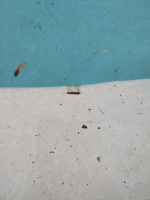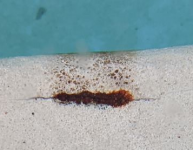While opening up the pool this season, I discovered a rust stain which appears to be coming from a hairline crack along the front edge of a bench/shelf in my deep end:


From what I can tell online, I either need some $10 magic underwater goo, or I need to sign the deed of my house over to the pool store immediately.
On a serious note -- would anyone be able to offer some advice? Plaster is pretty old and starting to show rough spots in a bunch of places, but no other major gaps/holes/cracks that I'm aware of.
Couple specific questions:
Sean


From what I can tell online, I either need some $10 magic underwater goo, or I need to sign the deed of my house over to the pool store immediately.
On a serious note -- would anyone be able to offer some advice? Plaster is pretty old and starting to show rough spots in a bunch of places, but no other major gaps/holes/cracks that I'm aware of.
Couple specific questions:
- Should I mess around with a DIY repair or am I more at risk of masking the problem and letting it get worse?
- Generally what I'm thinking here is use the acid tabs to clear the stain, chip out anything loose near the crackline, use an underwater patch. I also have the option of draining down to the shelf if that's preferable -- it's only a foot or two down.
- How urgently does this need to be addressed? (If a re-plaster is needed could it wait 'til the end of the season or even beginning of next)?
Sean

